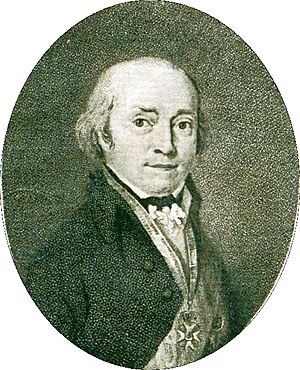Christian Graf von Haugwitz facts for kids
Christian August Heinrich Kurt Graf von Haugwitz (born June 11, 1752 – died 1832) was an important German statesman. He is most famous for being the Foreign Minister of Prussia during the time of the Napoleonic Wars. These wars were a series of major conflicts in Europe led by Napoleon Bonaparte.
Contents
Early Life and Career
Christian von Haugwitz was born in a place called Peucke, near Oels. His family, the Haugwitz, were an old noble family from Silesia. He studied law and then spent some time traveling in Italy.
After his travels, he returned to his family's lands in Silesia. In 1791, he was chosen to be the general director of the province by the local leaders. The King of Prussia, Frederick William II of Prussia, asked him to join the Prussian government. Haugwitz then became an ambassador in Vienna in 1792. By the end of that year, he joined the main government team in Berlin.
Prussia's Policy Before Napoleon's Rise
Haugwitz was present at important meetings about how German powers should deal with the French Revolution. He did not agree with those who wanted to interfere in France's internal affairs. However, when the War of the First Coalition began, peace became impossible.
The relationship between Austria and Prussia was difficult. This made it hard for them to win the war. Haugwitz then helped create a treaty where Great Britain and the Netherlands would pay Prussia money to help fight France. This treaty was signed in the Hague in 1794.
However, Haugwitz was not known for strong, aggressive actions. Prussia did not use the money effectively, which made Pitt (the British Prime Minister) lose patience. Great Britain ended the treaty in October. Haugwitz played a key role in the Peace of Basel in 1795, which brought peace between Prussia and France.
Serving During the Napoleonic Wars
After the peace treaty, Haugwitz wanted to protect the Prussian lands on the left bank of the Rhine River. He hoped to keep these lands safe by making northern Germany neutral and getting France to agree to this.
But Napoleon Bonaparte's victories changed everything. The French conquered southern Germany. Haugwitz, who still had the trust of the new king, Frederick William III of Prussia, saw that neutrality was no longer possible. He urged the king to join the War of the Second Coalition against France in 1798.
However, the king still believed in staying neutral. Haugwitz continued to work for a policy he disagreed with. In 1803, he finally resigned when the king refused his advice to demand that French troops leave Hanover. In August 1804, Hardenberg took his place, and Haugwitz went back to his estates.
Return as Foreign Minister
Even in retirement, Haugwitz was still asked for his advice. He strongly argued against getting closer to France. His views did not have much impact until Napoleon marched troops through Prussian territory in Principality of Ansbach. This made the king very angry.
Haugwitz was then appointed foreign minister again, working with Hardenberg. He was given the task of delivering an ultimatum (a final demand) to Napoleon. This happened after Tsar Alexander I visited Berlin in November.
But Haugwitz hesitated. He delayed his journey, hoping for events to change or for the Prussian army to get ready. He was worried about rumors of separate peace talks between Austria and Napoleon. When he finally met Napoleon, Napoleon understood Haugwitz's weakness. He kept Haugwitz busy with talks until the Battle of Austerlitz was decided.
Instead of delivering the ultimatum, Haugwitz signed a treaty of alliance with Napoleon on December 15, 1805. This treaty, called the Treaty of Schönbrunn (1805), gave Hanover to Prussia. In return, Prussia had to give up other territories like Ansbach, Cleves, and Neuenburg.
Further Humiliation and Final Retirement
Prussia and Haugwitz faced even more humiliation. In February 1806, Haugwitz went to Paris to confirm the Treaty of Schönbrunn. He hoped to make some changes that would benefit Prussia.
However, Napoleon was furious. He forced Haugwitz to tear up the treaty and sign a new one. This new treaty made Prussia give up twice as much land. It also forced Prussia to stop trade with Great Britain by closing the Hanoverian ports. This treaty, signed on February 15, left Prussia completely alone in Europe.
Haugwitz remained the head of Prussia's foreign affairs. But he could no longer control the direction of Prussian policy. The final ultimatum to Napoleon was forced upon him by difficult circumstances. After the Battle of Jena on October 14, his political career ended. He went with the king as he fled to East Prussia. After that, he left the king and retired to his estates in Silesia.
In 1821, he became a Curator for the University of Breslau. In 1820, due to poor health, he moved to Italy. He stayed there until he died in Venice in 1832. His grave is in Este, in the garden of the Villa Contarini (Este).
Terminology Note
- When you see Graf in a German name, it is a noble title like "Count," not a first or middle name. The female version is Gräfin.
See also
 In Spanish: Christian Heinrich Kurt von Haugwitz para niños
In Spanish: Christian Heinrich Kurt von Haugwitz para niños


